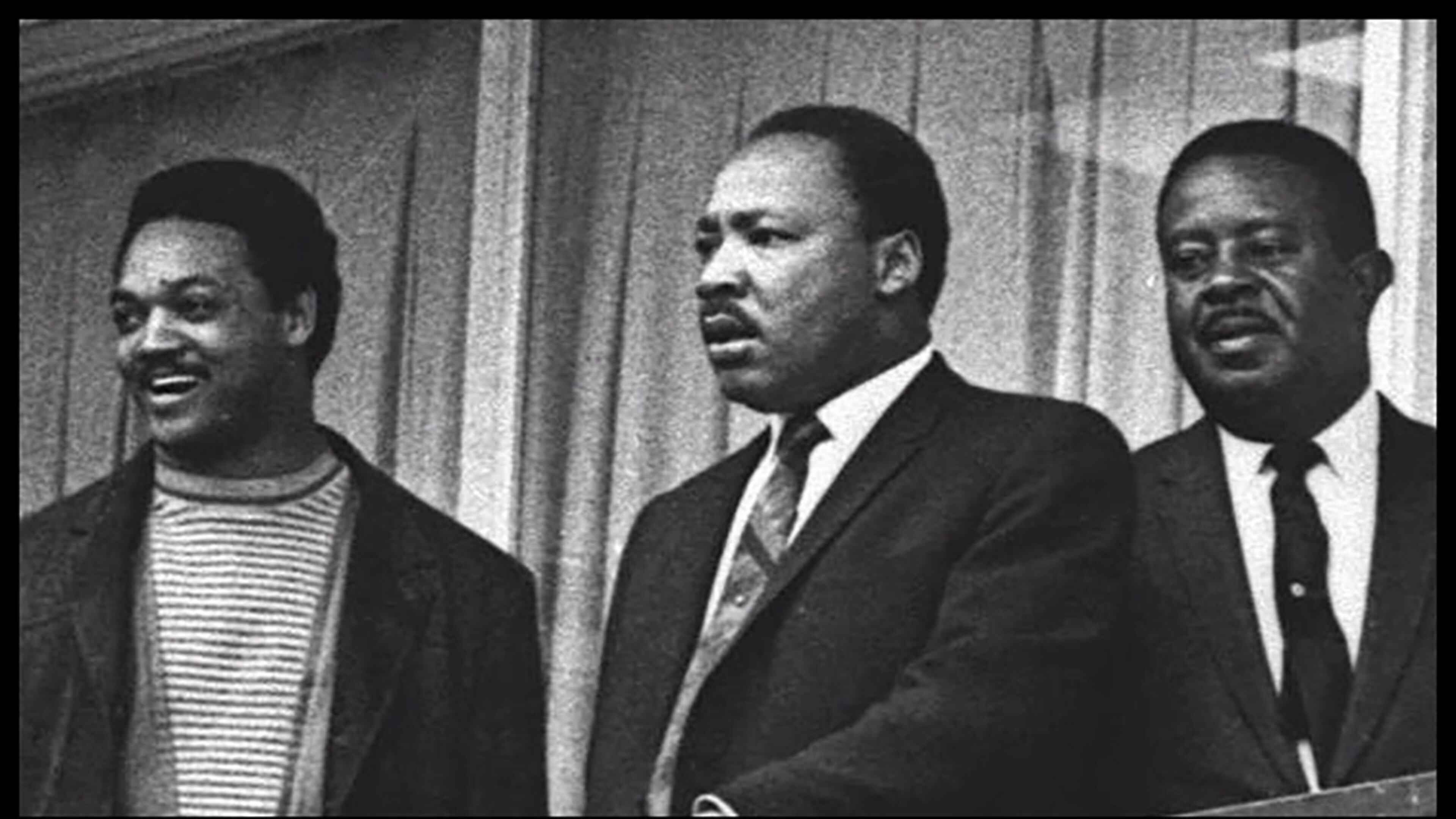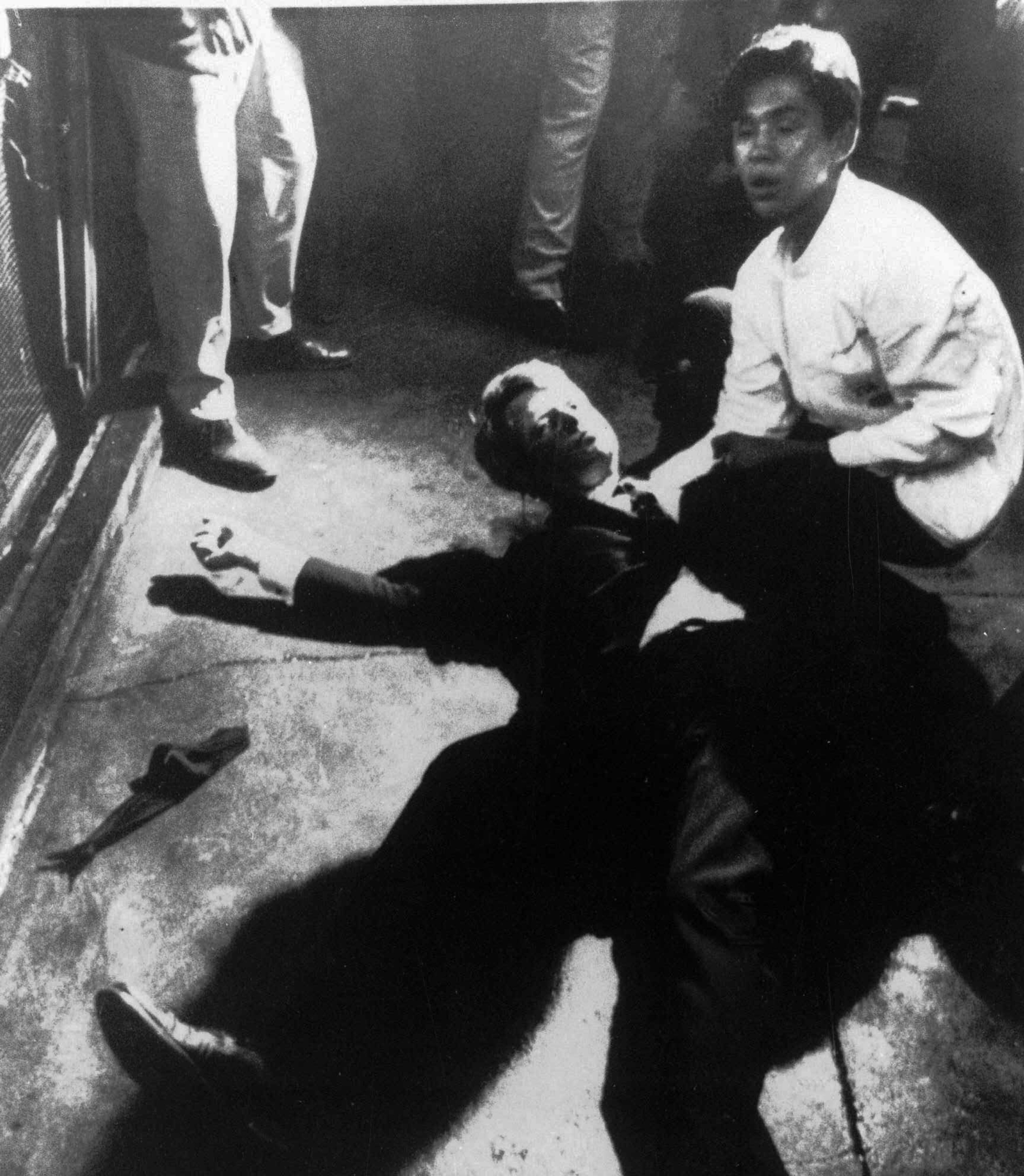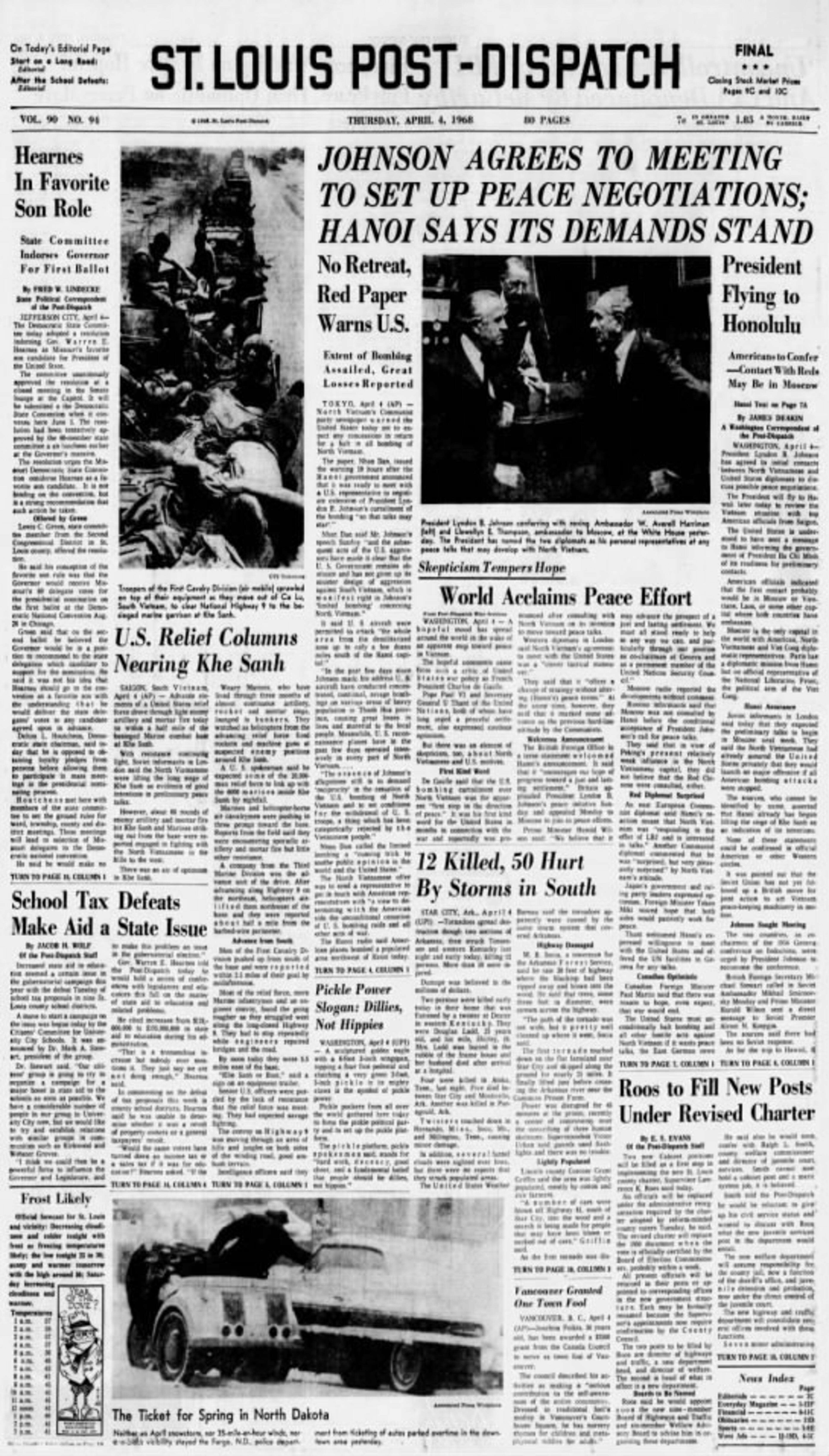The day before King was killed

On the day before, Top 40 listeners still couldn’t get enough of Otis Redding’s “(Sittin’ on) The Dock of the Bay,” the No. 1 song for four weeks in a row.

On the day before, two of the top-grossing movies of the year premiered: “2001: A Space Odyssey” (No. 1) and the very first “Planet of the Apes.” The latter was a film about an intolerant majority subjugating those of a different race.
On April 3, 1968, the day before the assassination of Martin Luther King Jr., we were paying 33 cents a gallon for gas. The federal minimum wage was $1.60 an hour, and the average new home price $24,500.
The year 1968 would be one of the most tumultuous in recent U.S. history. But on April 3 many of those transformative events had not yet taken place, and that day’s headlines were not of the screaming variety.
The year had already yielded some big stories, however.
The months before April 4
On Jan. 30, the Vietnam War took a major turn with the Tet offensive, when the North Vietnamese conducted a large, coordinated attack: 85,000 troops assaulted five major South Vietnamese cities and scores of towns and villages. Although the offensive was a military defeat for the North Vietnamese, it succeeded in undermining the South Vietnam government and in reducing the public’s support for the war in the U.S.

Racial tensions had simmered in Orangeburg, S.C., in February 1968, beginning with a demonstration at a whites-only bowling alley. On Feb. 8, three black students were shot and killed by police, and another 27 students werewounded in the melee.
On Feb. 12, Memphis sanitation workers voted to strike from jobs that paid as little as 65 cents an hour. The workers had no health benefits, no overtime, no vacation. They didn’t even have a place to shower after a day of hefting leaking tubs of garbage onto their shoulders. The strike would draw King to Memphis the next month.
On Feb. 28, the Kerner Commission released its nearly 600-page report on racial violence in American cities. The commission identified 150 riots in American cities from 1965 through 1967, including the deadly confrontations in Newark and Detroit that led LBJ to form the commission. The panel concluded that “white racism” — and not a conspiracy among black militants — was responsible for racial turmoil in our streets.
One of the most notorious events of 1968 wouldn’t be made public for another year. On March 16, U.S. soldiers at My Lai massacred 504 Vietnamese civilians. The Americans were searching for elements of a Viet Cong battalion; instead they found a village in which unarmed people were eating their breakfasts. Among the dead: 187 women, 17 of them pregnant; 173 children; and 60 elderly men.

On March 31, President Johnson shocked the nation when he announced that he would not seek re-election. Two weeks earlier, Eugene McCarthy had made an unexpectedly strong showing against Johnson in the New Hampshire primary, and Robert Kennedy had jumped into the race.
The morning of April 4
The morning papers of April 4 led with reports of peace overtures from North Vietnam, U.S. efforts to break the siege of Khe Sanh, the shock waves from President Johnson’s announcement from four days before, and the fact that the New York Stock Exchange posted record volume of 19.3 million shares.
Those headlines also dominated the front pages of the Journal and the Constitution, which were separate newspapers then.
The Atlanta Constitution, April 4
President Lyndon Johnson was set to fly to Hawaii to meet with U.S. military commanders in Vietnam to discuss new peace overtures from Hanoi. The North Vietnamese had floated a four-point peace plan that the U.S. had rejected before.
A force of 20,000 U.S. and South Vietnamese troops had fought to within three miles of Khe Sanh, where 6,000 Marines had been surrounded by enemy troops for months.
In his daily front-page column, Ralph McGill wrote about LBJ’s decision not to run for re-election.
Another story quoted a state Democratic leader as backing a Hubert Humphrey-John Connally ticket.
“If the South can put up a blockade to Bobby Kennedy, I think we’ll do it,” said James Gray of Albany, chairman of Georgia’s Democratic party. Kennedy would be assassinated 62 days later.
A brief item on page one noted the death of an Atlanta Marine: Maj. William H. Seward, a helicopter pilot, was flying a special ops team on a mission near the Laotian border. The bird came under enemy fire and crashed. Seward was trapped inside the burning hulk and died.
The Atlanta Journal, April 4
As the afternoon paper, The Journal on April 4 published a story it had covered earlier that day. It was delivered to thousands of doorsteps just a few hours before King was shot in Memphis:
“The George Wallace petition-gathering drive got launched here Thursday in a flood of straight-out white supremacy talk and flat predictions the Alabaman will be elected president in November.
“Former Lt. Gov. Peter Zack Geer got the biggest round of applause when he asserted Wallace was going to ‘save us from Stokely Carmichael, Martin Luther King, Ralph McGill and Eugene Patterson.’”
In addition to covering the George Wallace story, the Journal also led with LBJ flying to Hawaii. Its front page had two other Vietnam stories, including Khe Sahn.
Inside the paper: Pete Maravich said earlier that being the all-time top scorer in the SEC was “not worth a damn unless you win the game.” Op-ed columnist Pierce Harris Journal worried about how “the words ‘Damn’ and ‘helluva’ have crept into the sports columns and interviews with coaches, both losers and winners.”
And longtime Journal columnist Hugh Park noted that Lockheed C-130 planes, troop transports made in Marietta, were being used to transport elephants in Vietnam, four per flight.
The upheaval continued
The world did not slow down after King’s death. Rioting in major U.S. cities claimed 46 lives in the days after his assassination.

In May, Ralph David Abernathy would begin the “Resurrection City” encampment on the National Mall in Washington as part of the SCLC’s Poor People’s Campaign. Weeks later the encampment would be demolished by police after a series of clashes.
On June 5, Robert Kennedy was assassinated at a Los Angeles hotel just after he claimed victory in the California Democratic primary.
An extraordinary outburst of violence all but overwhelmed the Democratic National Convention in Chicago in August. Thousands of anti-war demonstrators converged on the city. Waiting for them were 12,000 city police and 12,000 soldiers and National Guardsmen armed with rifles, tear gas and clubs. The police went on a rampage, severely beating demonstrators, bystanders and especially reporters and cameramen. That night the nation saw bloodied reporters interviewing bloodied demonstrators.

On the day before, we were a nation at war, in Vietnam and in our own streets. Martin Luther King’s work on this Earth was not done. But he left us with these memorable and prophetic lines from this, his final speech.
He delivered it on the day before.
Well, I don’t know what will happen now. We’ve got some difficult days ahead. But it doesn’t matter with me now. Because I’ve been to the mountaintop. And I don’t mind. Like anybody, I would like to live a long life. Longevity has its place. But I’m not concerned about that now. I just want to do God’s will. And He’s allowed me to go up to the mountain. And I’ve looked over. And I’ve s-e-e-e-n the promised land. I may not get there with you. But I want you to know tonight, that we, as a people, will get to the promised land. And I’m happy, tonight. I’m not worried about anything. I’m not fearing any man. Mine eyes have seen the glory of the coming of the Lord.
Other front pages from April 4, 1968

The Nashville Tennessean leads with Johnson going to Hawaii and has the Khe Sanh story. But the off-lead was the most interesting story of the day: an 18-year-old admitted to setting fire to his high school because he had bad grades.
Because the high school was destroyed, the students were forced to go to the middle school on a split schedule. The suspect then set fire to the middle school because the new schedule made him late for work.
Also: The state Senate on the final day of the session passed districting legislation that “virtually assures election of a Negro senator from Davidson County (Nashville) this year.”



The March 21 documentary 'The Last Days of Dr. Martin Luther King Jr.' on Channel 2 kicked off a countdown of remembrance across the combined platforms of Channel 2 and its partners, The Atlanta Journal-Constitution and WSB Radio.
The three Atlanta news sources will release comprehensive multi-platform content until April 9, the anniversary of King’s funeral.
On April 4, the 50th anniversary of Dr. King’s assassination, the three properties will devote extensive live coverage to the memorials in Atlanta, Memphis and around the country.
The project will present a living timeline in real time as it occurred on that day in 1968, right down to the time the fatal shot was fired that ended his life an hour later.
The project will culminate on April 9 with coverage of the special processional in Atlanta marking the path of Dr. King’s funeral, which was watched by the world.


